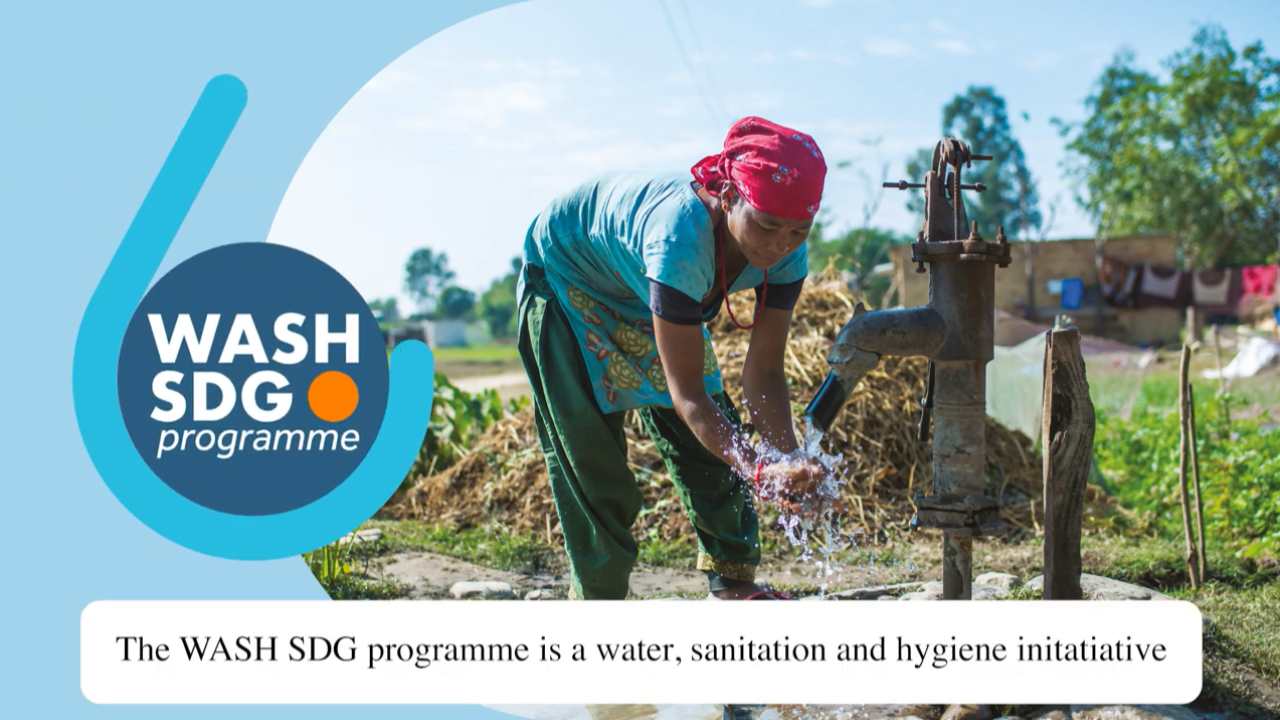WASH SDG
The goal of the WASH SDG programme was to sustainably improve access to, and use of, safe drinking water for at least 450,000 people, sanitation for at least 2 million people and improve the hygiene behaviours of 1.6 million people.
About the WASH SDG programme
WASH SDG refers to the Water, Sanitation & Hygiene (WASH) Sustainable Development Goals (SDG). The programme responded to the Dutch government commitment to contribute to Sustainable Development Goal (SDG) 6; reaching an improved water, sanitation and hygiene (WASH) situation for all by 2030.
We are proud to have been in the lead of this important programme. In the Endterm Review it was concluded that "the WASH SDG programme has been successful in achieving its stated objectives. It has delivered on the programme commitments it made to (sub-)national governments and the donor".
Strengthening the WASH system
The WASH SDG programme worked across 73 sub-national districts in seven countries with a total population of more than 9.5 million people. In all those districts, together with our international and national partners, we focused on improving the overall WASH system. A system where government, businesses and citizens all play a role and balance each other so that the right to water and sanitation is achieved and maintained.
The baseline
When we started the WASH SDG programme in the 73 districts, this was the situation:
Situation in 2017
85% had no access to safely managed water
86% had no access to a basic hand washing facility
47% had no access to basic or improved sanitation
Outcomes
During the WASH SDG programme a lot of progress was booked:

The WASH SDG programme's goal to sustainably improve access to, and use of, safe drinking water for at least 450,000 people, sanitation for at least 2 million people and improve the hygiene behaviours of 1.6 million people has been more than accomplished.

Sustainability and inclusion
Numbers alone don't tell the entire story. The WASH SDG programme is built on three key objectives:
- Increased demand for improved WASH facilities and practices through improved behaviour change interventions;
- Improved quality of service provision leading to increased availability and affordability of WASH products and services which contributes to sustainable and equitable access to WASH;
- Strengthened WASH governance and institutional framework in the sector, leading to governments enabling efficient and effective delivery of inclusive and sustainable WASH services which contributes to sustainable and equitable access to WASH.
We worked on establishing a system wherein all stakeholders take up their roles and responsibilities. Through coaching, strengthening activities and advocacy, and by promoting change in behaviour and norms regarding WASH and gender equality, we contributed to an enabling environment wherein the system can succeed, last and accelerate, without external funds.
We also asked ourselves the more difficult questions:
- How do we guarantee the sustainability of the results?
- Do we reach the poorest households?
- Do we include the most marginalised groups in decision-making?
- Can we create bigger impact through leverage?
Examples of how we tackled these issues can be found in the WASH SDG Magazine. The Endterm Review is available on the website of the Ministry of Foreign Affairs.
More downloads:
Consortium budget: €67,000,000, Simavi budget: €28,100,064, Duration: 7 years, Location: Bangladesh, Ethiopia, Indonesia, Nepal, Tanzania, Uganda and Zambia, Role Simavi: Consortium lead
Partners
The programme consortium consisted of the Dutch partners of the WASH Alliance International (WAI), SNV, and Plan International Netherlands – led by Simavi. And, we worked with many in-country partners as listed below.
In-country partners WASH Alliance Bangladesh
In-country partner WASH Alliance Nepal
In-country partners WASH Alliance Uganda
Consortium partners
WASH Alliance partners
Do you want to know more about system strengthening? Get in touch with Saskia Geling!

Other programmes
WASH Learn & Share
More than half of all schools in Uganda lack adequate toilet and water facilities. For girls in particular, this means they regularly miss school. With the WASH, Learn & Share project, we are working to improve health, education and well-being for all.
Water Justice Fund - grassroot grants to the water crisis
Millions of women and girls are hit hard by the water and sanitation problems caused by climate change. The Water Justice Fund supports local women groups in Kenya, Nepal and Bangladesh and journeys with them to realize locally-led and women-owned solutions to water and climate challenges.
Sarwacha
Simavi and Dopper are working with local partners, ENPHO and Biruwa, to ensure a sustainable water supply for Changunarayan. Families in the fast-growing municipality Changunarayan in Nepal lack safe drinking water.





























